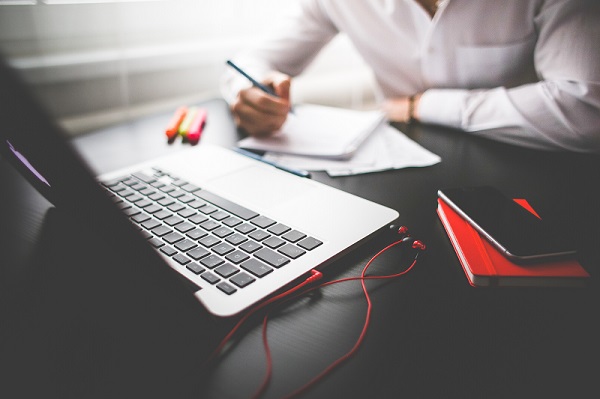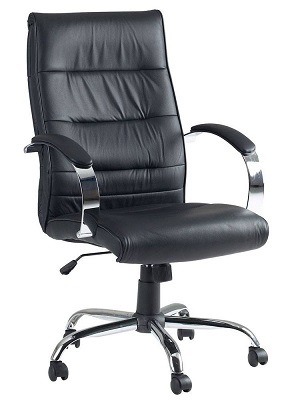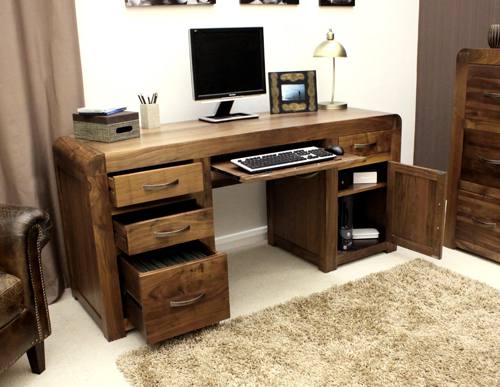Sales line (01507-611065) open : Monday - Friday, 9.30am - 5.15pm.
16 Productive Study Space Tips For Perfect Exam Preparation
People who are successful in exams tend to have two great advantages over those who don't perform as well:
Firstly, they are well prepared. And secondly, they have a dedicated study space where their preparation takes place.
But you might be wondering how to create a study space at home to give yourself the best preparation ahead of your upcoming exams. This post will make it easy for you.

Creating a dedicated study space can help to boost productivity when you are preparing for exams. Image credit: picjumbo.com. Apple, the Apple logo and iPhone are trademarks of Apple Inc., registered in the U.S. and other countries.
Take a few minutes out of your schedule and follow some (or all!) of the tips below to turn your chosen area into a productive study space.
Here we go...
1. Boost productivity by studying in the place where you work best
The place where you study can greatly affect how well you work. Some people prefer to be locked away in a bedroom, while others like the open space of a downstairs area with occasional background noise from the family.
Whichever you prefer, make sure that you choose an appropriate area to study – and make it your own. When you're studying there, make it obvious what you're doing and that this is your own personal space for work.
2. Create a calming atmosphere with pleasant scents
It's hard to concentrate with distractions, and those can include bad smells. Jokes about the state of teenage bedrooms aside, it can be beneficial to fill your study area with pleasant aromas to create a calming atmosphere and to help stimulate your mind.
Here are some easy ways to get your chosen study space smelling lovely:
- Spray an air freshener.
- Burn scented candles.
- Burn essential oils in a burner.
3. Keep focused by removing clutter
A chaotic desk is no good when you want to study; it only causes unnecessary stress. A clutter-free desk on the other hand will help to keep your mind calm, which is what you need when you're trying to absorb information for your exams.
To keep your desk tidy, keep your notes tidily stored in files and use storage boxes and drawers to keep stationery tidily stored away until you need them.
4. Relax yourself with ambient background music
When you're studying, the last thing you need is to be stressed. Music can be a great way to help relax your body and mind to make yourself more productive.
The best kind of music to listen to whilst studying is something ambient or instrumental. Try and avoid music with lyrics as these can be distracting, as can heavy or loud music. You want the music to be soothing, not something that makes your head spin.
5. You'll study better if you're comfortable
Comfort is a massive factor in how well you study and learn. If you're uncomfortable, it can be difficult to concentrate on your work and you might become agitated and fidgety. This isn't ideal when you need to focus.
A good way to keep comfortable is to ensure that your desk is the right size. You should be able to rest your elbows on the table or desk – ideally the height should be somewhere between your waist and the bottom of your ribcage when you sit down.
Also make sure that the chair you're sitting on while you study is comfortable, and that it also offers a good amount of support to keep your posture healthy.

A comfortable chair can help to keep your studying productive and stress-free.
6. Absorb more information by keeping yourself alert
While it's important to be comfortable while you study, don't make it too comfortable. Sure, you need your chair to be comfy enough to relax in whilst you work, but don't make the mistake that many make; studying on the bed.
It might seem appealing to drag all your books into bed with you, but this can make you feel tired and lethargic – hardly ideal when you need to be as alert as possible. Instead, keep the bed out of the equation and do all of your studying at a table or desk with a comfortable chair.
7. Stay focused by keeping essentials close by
You might easily become distracted if you constantly need to leave your study space to find supplies. This will of course ruin your productivity, so overcome the problem by keeping all of your essentials close to hand.
Ensure that you have ample stationery, paper and all the required books within easy reach to remove the need to leave your study space.
8. Inspire yourself with personalised photos
Even the most gifted students find it hard to study sometimes, and every now and then you might need a little bit of inspiration to see you through.
Decorate your study area with photos of family and friends, or sentimental keepsakes that mean something to you. These can help to relax you by marking the space as your own, and can also act as inspiration as you strive to perform well in front of the people who mean most to you.
9. Let there be light to relieve the strain on your eyes
For many students, studying is a task that can last long into the night. But as darkness falls, many people become so engrossed in their work that they forget to light up the room. This can mean that your eyes become strained as they work harder to see what you are doing.
Relieve this strain by keeping the room as light as possible. In the daytime, throw the curtains open wide to let in as much natural light as possible. And if you study at night, keep a light on and try using study lamps to ensure you can see properly.
10. Stay comfortable with a pleasant temperature
The temperature of the room can greatly impact on how well you study. Too cold and you'll be left shivering; too hot and you could become drowsy and tired.
Try to create your study space in an area that has a fairly stable and consistent temperature. Remember to also keep a cardigan or jumper close by in case you feel a little chilly.
11. Reduce interruptions to maintain your focus
One of the biggest distractions to your studies can be interruptions from friends and family members.
Reduce the chances of being disturbed by studying in a quiet area of the house away from distractions. You could also hang a 'do not disturb' sign on the door to make people aware that you're studying and are not to be interrupted.
12. Stay stress-free by making sure you have enough space
If your study space is too small and cramped, you will soon know about it. With books, paper, pens and laptops competing for space, you can be sure that you'll soon be stressed when it all starts piling up.
To avoid this unnecessary stress and strain, make sure that you choose a study area with plenty of space, and that your desk can comfortably hold all of your belongings whilst giving you the free space to write, make notes and type.

Keep your study area tidy and clutter-free with a spacious desk which includes plenty of storage for your study materials.
13. Breathe easier with the help of a plant
When you spend a lot of time in a single room, the air can become stuffy. It will also start to cause a build up of carbon dioxide – which you exhale when you breathe out – while oxygen levels will decrease. This isn't ideal because it can cause you to feel drowsy and tired.
Adding a plant to your study area can help to overcome this because plants take in carbon dioxide and expel oxygen.
14. Wind down by leaving the study area when you've stopped working
Studying and preparing for an exam is difficult, and there's a lot of hard work involved. But when you finish for the day, that work space should be left alone.
It might be tempting to put your work away and fire up some videos on YouTube for a quick pick-me-up. But this can lead to you associating the area with different activities, when it should be reserved for studying.
Instead, leave the work space and move to another area of the house or room to wind down and relax after a period of studying.
15. Incorporate colour to promote calmness and concentration
If you're serious about passing your exams, you'll be determined to do anything in your power to prepare as best you can. Bringing some flashes of colour into your study area can help in a similar way to the scents we discussed in tip #2.
You might want to consider the following colours:
- Red – Boosts attention and alertness.
- Blue – Useful for creativity.
- Green – Helpful in generating ideas.
- White – A calming colour that can reduce stress.
- Orange – A warming colour that may help to relax you.
You don't have to take a tin of paint to all four walls around you; even small cushions and trinkets can help to bring the benefits of colour to your revision.
16. Motivate yourself with rewards and incentives
Let's not kid ourselves – revision is hard work. Getting through it can feel like an endless battle at times. But rather than tackling it in one big chunk, break it into smaller and more manageable segments.
To get yourself through each of these, give yourself an incentive that you will reward yourself with at the end. It could be something like taking a ten minute break, allowing yourself a snack, or making a phone call to a friend.
Write your chosen reward on a sticky note and leave it close by to remind yourself of what you have to look forward to. The prospect of doing something you will enjoy will spur you on to work hard through your studies.
"By failing to prepare, you are preparing to fail"
So, there you have it:
Your foolproof guide to creating a productive study space at home. If you have exams looming, having a dedicated area where you can study is essential in preparing effectively.
As the author and philosopher Benjamin Franklin once said: "By failing to prepare, you are preparing to fail."
If you found this guide helpful, click the buttons below to share with your classmates on Twitter or Facebook!



















